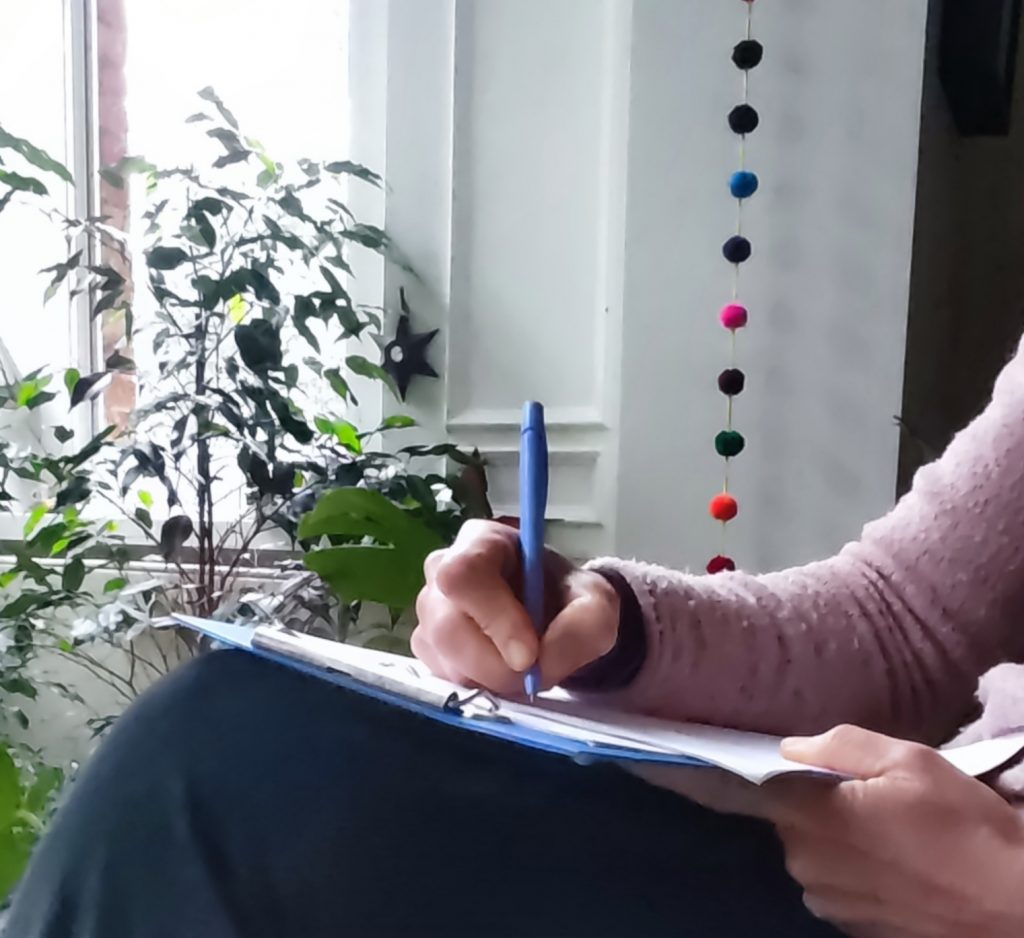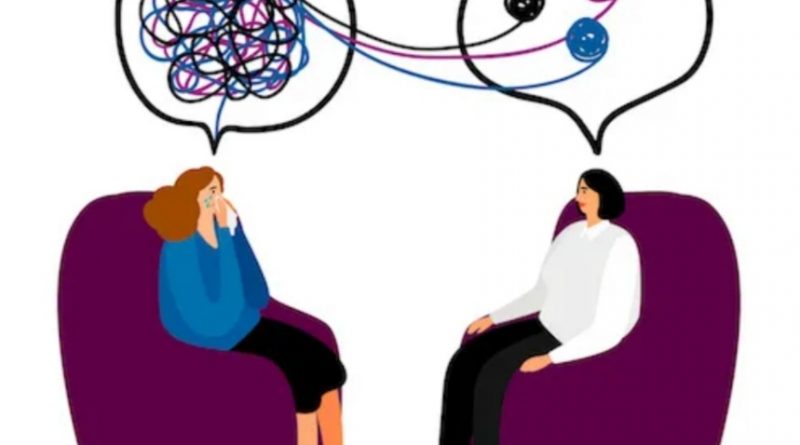The Science of Understanding: A Psychologist’s Journey
Berta is a clinical psychologist who works in the mental health centre “C.H.S.” in Brussels. She is sitting at her office, sipping from a warm cup of her favourite tea, as she prepares to show us the personal and working life of a psychologist from up close.
Hello, thank you for having me. Let’s get started: my teacher told me to start with a funny question to break the ice, and I was wondering, would you do that with a patient?

Berta: Haha! Well, maybe not funny questions, but I do use questions to break the ice. The other day, I said to one of my patients “Oh, you got a new piercing” and apparently, I had already made the same remark the previous time, but I got confused because I thought there was a “second” new piercing, whereas it actually was the same one… So it was kind of funny, even though that’s not the way I meant it!
Why did you choose to study psychology?
It took me a loooong time to figure out that this was what I wanted. I chose psychology after having done other studies in my undergraduate and my postgraduate. I was doing a master’s in Philosophy of Science, and wrote my thesis on autism from an evolutionary perspective: that sparked my interest in psychology. But I think the reason why it suits me is that there’s a lot of interaction with people. Until then I had done a lot of reading, research, writing… this was more personal.
Now that you have had experience as a professional, would you choose it again or would you like to study something else?
I would a hundred percent choose it again, I would maybe choose it earlier, since I started it quite late. But maybe if I had chosen it earlier, I would have gotten tired of it, so… But yes, I would definitely choose it again.
Are there any differences between your expectations when starting to study psychology and your experience as a professional?

I think that when I started to study psychology, I was still coming at it from an angle of understanding, researching, the theory -and slowly I moved more to the clinical side, which I knew less about in the beginning. It moved in that direction without me expecting it to.
Has the way you work changed with time? Do you have a new way of seeing things?
I think so, at the beginning of my career I was very keen on doing it “right”, now I’m still keen on helping of course, but I’m less tied to doing things the “right way”. I don’t think there is so much a right way. I studied in the U.K., the way they approach psychology there, there’s lots of emphasis on “evidence base”: what works, what doesn’t work, following protocols… And I think with time I’ve come to think it’s more about how you are during sessions, than about what you do.
Is there any age range you prefer to work with?
I love the variety of age ranges in my work, I’m lucky to work with all ages, from young children to older people, all sorts. At the moment I tend to see quite a bit of teenagers and young adults, I find that age range interesting, it’s kind of the opening into a different stage of life.
It is a very transitional stage.
Yeah, which is funny because I don’t like transition or change, but I like working with it. So yes, older teenagers, young adults, but I like the variety, I really appreciate having options.
How do you feel when a patient finishes their therapy, and you have to say goodbye to them?
Very mixed feelings. Often, it’s relief, relief that it ended, as it usually ends because the work is completed, and they are in a better place. Sometimes it ends because, although the work wasn’t finished, they moved country, or it wasn’t working… but that’s rare. When it ends well, I usually feel relieved and there’s a sense of satisfaction, a sense of privilege to have witnessed the progress that they made, a sense of gratitude, and not always, but sometimes I do feel a bit sad: I won’t see them again, I won’t know where life takes them. Sometimes you get attached, but it’s good to let go.
What was one of your best experiences during your career or your studies?
When studying, for me, the best part was the sense of really learning a lot. Opening my eyes and seeing different ways of doing therapy as I had different supervisors. But also, being able to share that sense of growing with friends, being able to go on that journey together. Working, often one of the best experiences is the beginning. When therapy starts, and there are many possibilities. It’s also very nerve-racking, the beginning is difficult, but it is very exciting.

And is there any part of your job that you don’t like as much?
There definitely was a part that I didn’t like at all: psycho-educational evaluations, tests for kids who had difficulties in school and then writing reports. I think it’s useful, but it didn’t match my interests, it was very repetitive, and it quickly became monotonous, boring, and too technical. And it wasn’t very subtle work, unless you spent many hours making it more nuanced. Now that I don’t do that anymore, there is nothing specific about my profession that I don’t like. However, I do like being on holidays and having free time! Sometimes work can be heavy because there’s a lot. The work is good but sometimes I just wish I was on holidays.
Do you think your work affects your personal life?
Yes, undeniably. I do manage to separate my job from my personal life, but I do take the emotions, the thoughts, the concerns about patients with me… In addition, as I work with teenagers, and I have some teenage kids myself, it impacts the way that I see my own kids, it brings a lot of perspective. But I think that’s positive.
If someone was looking to start a career in psychology, would you have any advice for them?
I would say to go for it. Maybe, influenced by my own experience, if they had done something else before, I would still advise them to now go for psychology. I think what you do before is never wasted time. In fact, I know several psychologists who didn’t do psychology from the beginning. I would maybe advise them, even though it’s very difficult, to think about where they would like to live and practice later on, as I have moved around quite a bit and have had a lot of trouble with degree recognition and bureaucracy in general. It is possible to get what you need, but it gets a little bit discouraging.
Okay, well those where all my questions, thank you so much for taking the time to do this interview.
Thank you for your interest, and very pertinent questions.
Matilde Federico Figueras / S4FRB / EEB1 Uccle




